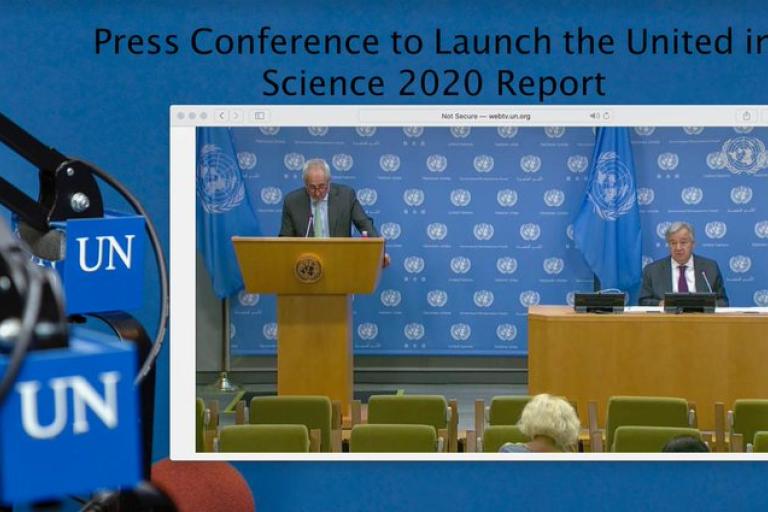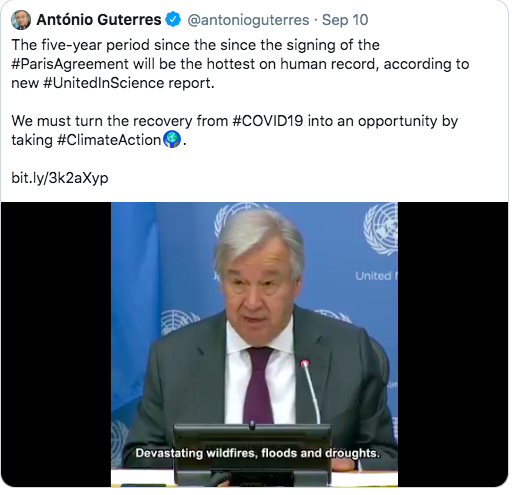UN Secretary-General launches United in Science report

United Nations Secretary-General António Guterres launched the high-level multi-agency United in Science report on 9 September with yet another appeal for urgent climate action to “ensure a liveable planet for this and future generations.”
“Our world remains off track -- far off track -- to meet the objective of the Paris Agreement to limit global temperature rise to 1.5 degrees Celsius. If things would remain as they are, we would go up 3 to 5 degrees above the pre-industrial level,” Mr Guterres told a press conference.
The United in Science 2020 report, the second in an annual series, is coordinated by the World Meteorological Organization (WMO). It includes input from the Global Carbon Project, the Intergovernmental Panel on Climate Change, the Intergovernmental Oceanographic Commission of UNESCO, the UN Environment Programme and the UK Met Office. It presents the very latest scientific data and findings related to climate change to inform global policy and action.

“The science is solid,” WMO Secretary-General Petteri Taalas told the press conference in a virtual linkup from WMO headquarters in Geneva. He presented the key findings of the report, and its underlying message of the report is that climate change has not stopped for COVID19. Greenhouse gas concentrations in the atmosphere are at record levels and continue to increase. Emissions are heading in the direction of pre-pandemic levels following a temporary decline caused by the lockdown and economic slowdown.
The presentation by Professor Taalas also highlighted the increasing impacts of climate change, which affects glaciers, oceans, nature, economies and human living conditions and is often felt through water-related hazards like drought or flooding.
“As the report shows, greenhouse gas concentrations reached new record highs in 2020. The last time levels were this high was between 2.6 and 5.3 million years ago, in the Pliocene era when there were trees at the South Pole and sea levels were some 20 metres higher,” said Mr Guterres.
“The five-year period since the signing of the Paris Agreement on Climate Change will be the hottest on human record -- with average global temperatures of 1.1°C above pre-industrial levels. The report also rings the alarm that there is a significant and growing chance of temporarily reaching the 1.5-degree threshold in the coming five years,” said Mr Guterres, citing data from the report.
“The latest data for Greenland alone shows an average loss of ice mass of 278 billion tons a year – more than 110 million Olympic sized swimming pools. And this is Greenland alone - 110 million Olympic sized swimming pools have lost ice in Greenland alone. Let’s not forget that there is Antarctica. Let’s not forget that there are glaciers all over the world,” said Mr Guterres.
Over the next five years, the Arctic is predicted to continue warming at over twice the overall global rate.
“We have a choice: business as usual, leading to further calamity; or we can use the recovery from COVID-19 to provide a real opportunity to put the world on a sustainable path,” said Mr Guterres.He outlined six climate-related actions to shape the recovery.

First, as we spend huge amounts of money to recover from the coronavirus, we must deliver new jobs and businesses through a clean, green transition.
Second, where taxpayers’ money is used to rescue businesses, it needs to be tied to achieving green jobs and sustainable growth.
Third, fiscal firepower must drive a shift from the grey to the green economy and make societies and people more resilient.
Fourth, public funds should be used to invest in the future, not the past, and flow to sustainable sectors and projects that help the environment and the climate. And so, fossil fuel subsidies must end, polluters must pay for their pollution, and no new coal power plants should be built. It is already cheaper to build new renewable energy capacity than to continue operating 39 per cent of the world’s existing coal capacity.
Fifth, climate risks and opportunities must be incorporated into the financial system, as well as all aspects of public policymaking and infrastructure.
And, lastly, we need to work together as an international community.
“As we work to tackle both the COVID-19 pandemic and the climate crisis, I urge leaders to heed the facts in this report, unite behind the science and take urgent climate action,” said Mr Guterres.
Details of Prof Taalas presentation, the report, press release, digital assets are available here










